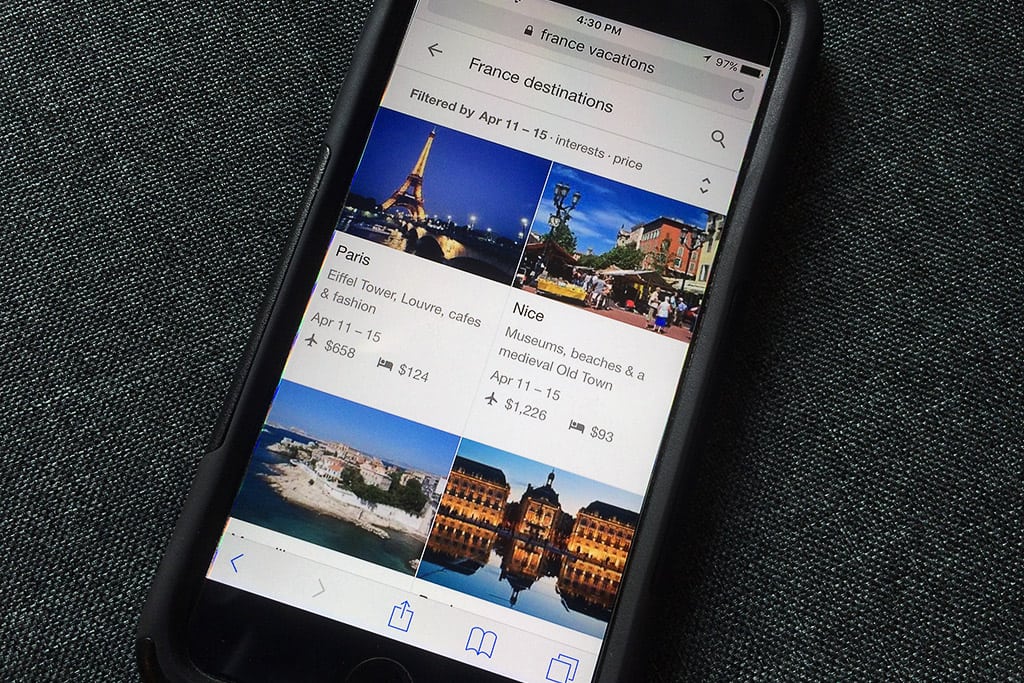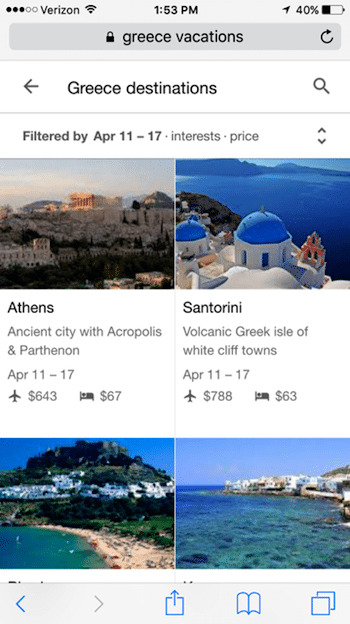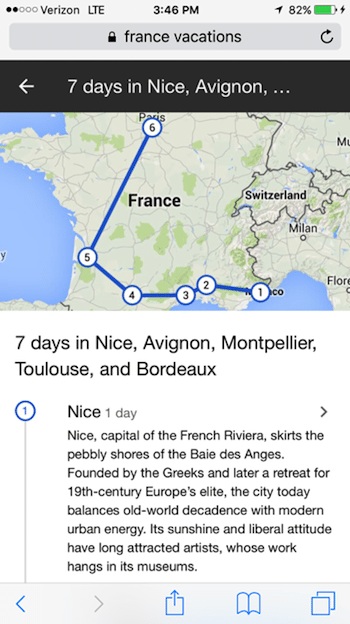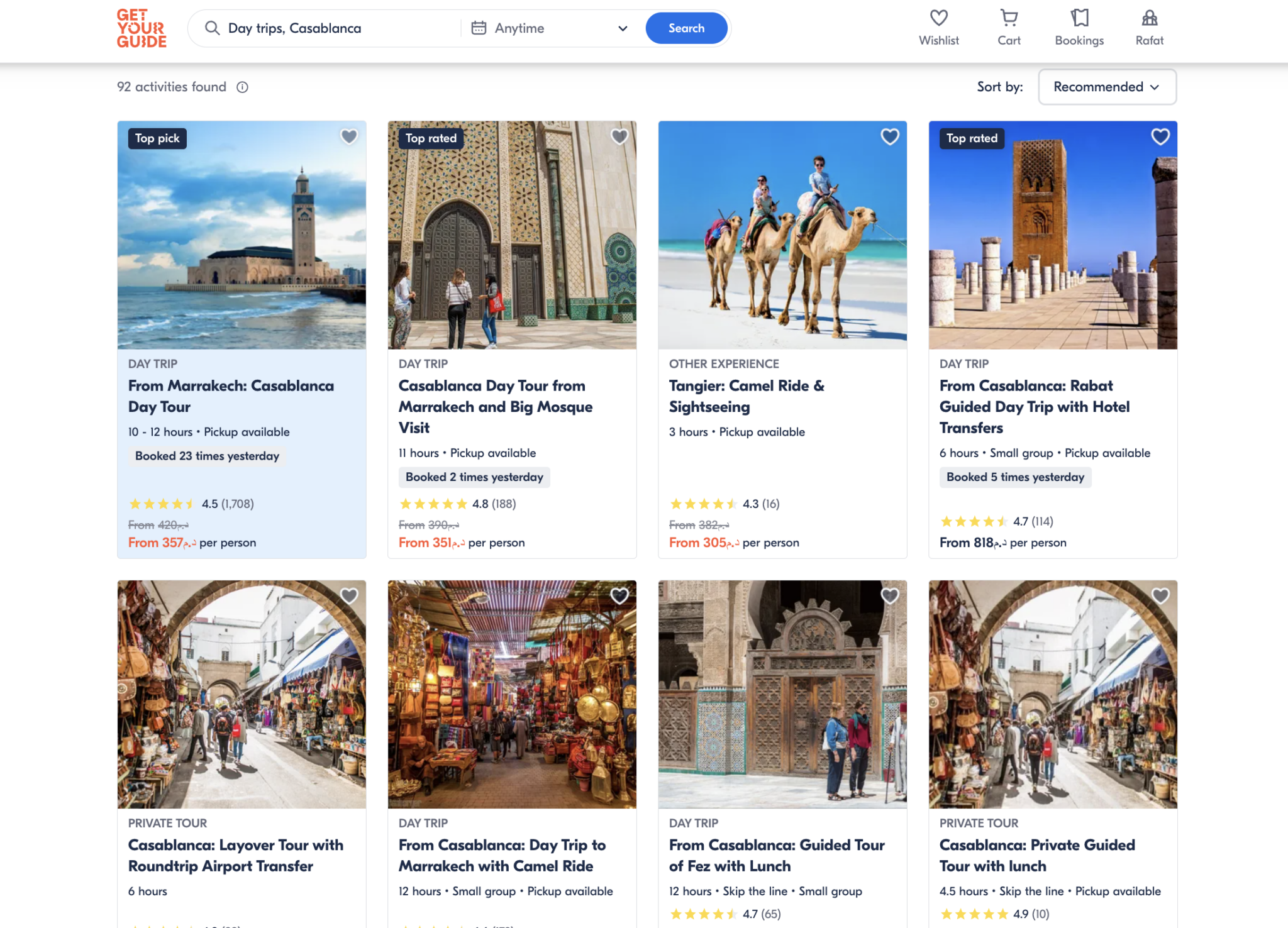Google’s New Mobile Tool Lets You Compare Destinations by Price

Skift Take
As part of a series of product introductions that Google began introducing in beta in November, the search engine has officially launched a feature on mobile that enables users to conduct side-by-side price comparisons of flights and hotels for disparate destinations within a country.
If you search for vacations in Greece and select “view all” when scrolling through photos of Greek destinations, you can select to filter the options by interests, dates or price.
Thus, if you choose “exact dates,” such as April 11 – 17, rather than “flexible dates,” you’ll see an Athens trip might cost $643 for the flight and $67 per night for a hotel while a trip to Santorini would be more expensive because the flight would cost $788 although a hotel stay there could be $63 nightly, a few dollars cheaper than in Athens, for the stay.
Drilling down and selecting Santorini, Google provides an overview of the island, its top sights, the best times to visit, the high and low temperatures by month, videos, a map, and under the header, “Plan a trip on Google Apr 11-17,” an estimated trip price of $1,165 for six nights at a 3-star hotel. Users can then navigate to Google Flights to select and book their flights on an airline or online travel agency site. Travelers can also view hotel options on Google.
To be clear, this feature, which is part of the official launch today of Destinations on Google, isn’t about to supplant TripAdvisor for trip-planning or hotel websites for booking anytime soon. There isn’t a specific URL website or tab where users can return the next time they want to try the feature because it is all integrated into Google search.
But in its relatively slow and Googlish way, the launch of Destinations on Google in English, Italian, French, German and Spanish is another signal of Google’s growing role in trip-planning and booking.
Suggested Itineraries
Destinations on Google, which had a soft launch in November and integrated Google Flights and Google Hotels in search for the first time, includes a number of other interesting features.
Another noteworthy feature is “Suggested Itineraries.” If you do a Google search on mobile for “France vacations” and scroll down to and select “France travel guide,” you can view suggested itineraries such as “7 days in Nice, Avignon, Montpelier, Toulouse, and Bordeaux,” or “4 days in Paris, Burgundy and Lyon.”
It’s a sort of digital trip-recommender.
If you decide to get more details about the 7-day trip, you can view an overview of Nice, for example, with its top sights, and then information about Avignon for the next day after a 2.5-hour drive etc., ending with two days in Paris after the two-hour flight.
In a kickoff briefing for the press yesterday in New York City, Google’s Radlhika Malpani, director of engineering for Google Travel, said the company mines data from Google Maps as a basis for suggested itineraries with the emphasis on “trips people actually take.”
In a question and answer session after the briefing, Malpani said Google does not analyze users’ Gmail about travel intent for Destinations on Google but does use Gmail to inform Google Now for cards displaying things such as airport gates and car rental offers.
In light of the relative complexity in actually booking some of Google’s suggested itineraries and using other trip-planning features, and given that there is a burgeoning trend among some travel startups to integrate live travel agents into their apps, Malpani was asked whether Google had any such plans. She said Google has no such plans.
Derek Coatney, product manager for Destinations on Google, explained that Google doesn’t monetize the feature itself but gets revenue from partners when users click off to Google Flights or Google Hotels to book their travel.
Coatney said Google places the user experience above all else in importance.
However, all of the booking experiences flow through Google’s own products for monetization purposes regardless of whether or not these products provide the optimal user experience.
Here’s a video of Rob Torres, Google’s managing director of Travel, discussing Destinations on Google on CNBC March 9:







